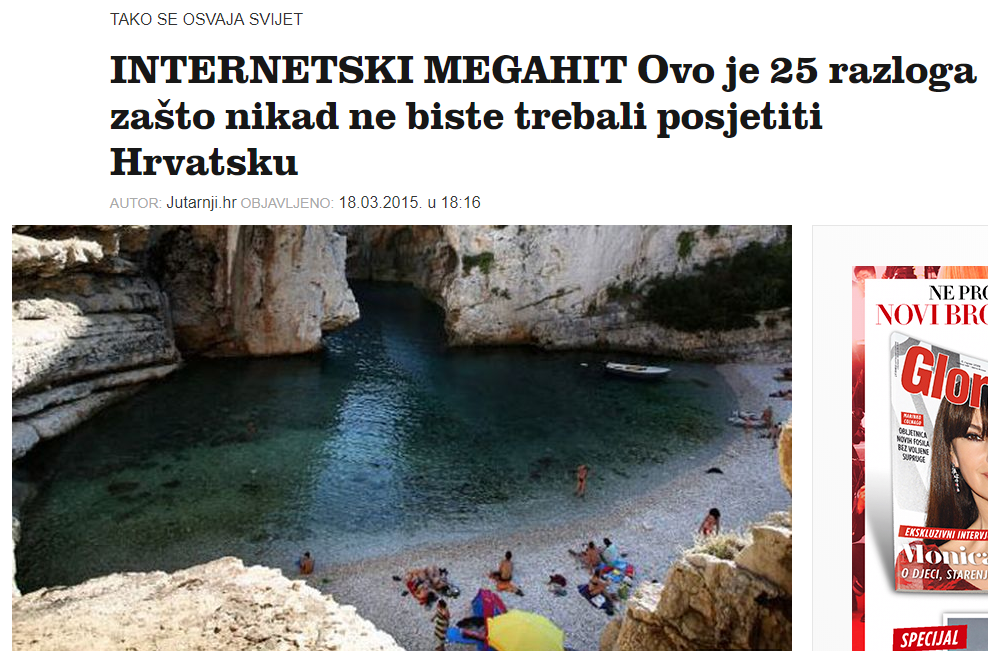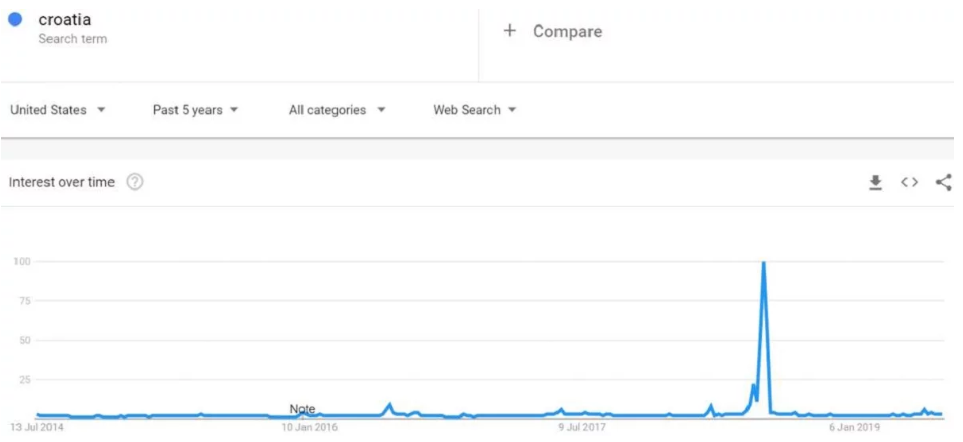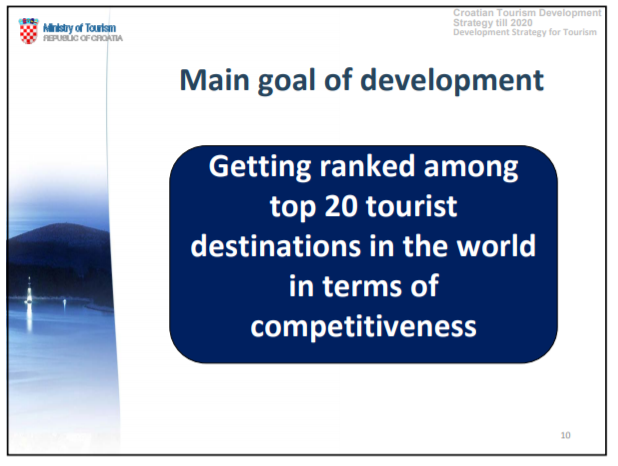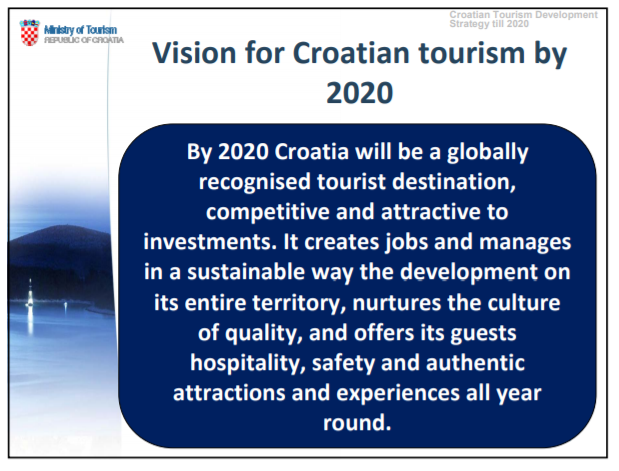Croatia Airlines Makes Changes to Operations this Winter
September 10, 2019 - As the summer season comes to an end, we look ahead to the winter in Croatia. Thus, Croatia Airlines has announced some small changes to its flight schedule this year.
Recall, Croatia will assume the Presidency of the Council of the European Union from January 1, 2020. With that said, Ex Yu Aviation reports that the national carrier will add a one flight per week between Brussels and Zagreb, totaling to 12 per week. Furthermore, the seasonal service between Zagreb and Dublin will work until January 26, 2020, while its operations between Zagreb and Lisbon will end at the end of October.
Croatia Airlines will maintain the same winter operations for other Croatian cities this year, which include flights from Split to Frankfurt, Munich and Rome, Dubrovnik to Frankfurt, and Rijeka to Munich. Croatia Airlines has also announced no changes to its winter operations between Croatian locations.
Recall, Croatia Airlines is currently undergoing a privatization process, which the Croatian Minister for Sea, Transport and Infrastructure, Oleg Butković, previously said should be completed by the end of the year. “I believe we will deliver within the set timeframe,” the Minister said. Privredna banka Zagreb (PBZ) and Germany's DVB Bank are advising the airline in the process.
While the national carrier projects a 5% increase in passenger traffic by the end of 2019, there are no plans to make any significant changes to its services until the privatization process is complete.
Ex Yu Aviation adds that Croatia Airlines even dropped its plans to extend the wet-lease for one of Air Nostrum's Bombardier CRJ1000 jets into the winter months, which would have lengthened some of its seasonal routes. Croatia Airlines currently maintains twelve routes from Zagreb during the summer.
Croatia Airlines has welcomed 960,620 passengers from January to June this year, which is an increase of 1.2% compared to 2018.
To read more about travel in Croatia, follow TCN’s dedicated page.
Zagreb Economist Claims Tourism is ''Curse'' For Resources in Croatia
A young Croatian scientist from the Faculty of Economics in Zagreb has stated his opinion on just what Croatia's deep attachment to tourism and little else is actually doing to the country. As Novac writes on the 9th of September, it isn't all as much of a walk in the park as many who rely on Croatia's strongest economic branch think it is.
''If there were no tourism, I believe that Croatia would be among the winners of the transition [countries] because we'd not be able to continue going down this wrong path,'' said Velibor Mačkić of the Zagreb Faculty of Economics for Novi list, adding that "tourism is an absolute curse of resources" and that without it "we'd have behave in a different way".
According to Mačkić, people in Croatia today aren't seeing investing in knowledge worth bothering with because ''why would someone invest in knowledge and graduate from a university that lasts for a minimum of five years and then get a job and have to pay huge amounts of income tax when they can stay in Primorje, Istria or Dalmatia and rent out some apartments and pay only a flat rate for doing that.''
In addition, he said that there is no real need for innovation in Croatia, because "jobs in Croatia aren't obtained because you're more cost effective or innovative, but because you know the right people." As a result, the perception of the state, and so the state itself, has become very weak.
''The state grew in size, but was increasingly inefficient and actually ''broke glasses'' when it brought the food to the table,'' Mačkić describes in illustrative terms.
''Instead of moving towards neo-corporatism, the Croatian state ended up as a weak state and is now in the ranks of the likes of Bulgaria and Romania,'' Mačkić explained.
To remedy all of this, the young scientist believes that we must start from a position of absolute transparency, both in terms of the budget and in the adoption and implementation of public policies and procurement processes.
''After that, then, rather paradoxically but unfortunately necessary in the domestic context, we'd need to reach a consensus on the importance and role of the public sector in the production of public good, correcting market failures and laying the foundations on which the private sector can secure and build the unprecedented competitiveness of its goods and services.
This includes the termination of the crusade against the so-called ''uhljebs''. Then, local and regional self-government unit employees will be brought into line. The politically determined and unnecessarily large number of local and regional units should be viewed in the context of administrative decentralisation, but more importantly fiscal decentralisation,'' says the young scientist.
''At this point, the next recession automatically implies a fall spending and revenue from VAT, while increasing expenditures on social services, ie, an increase in the budget deficit. The cards are split, those sitting at the table have no incentive to change anything. So the impetus for change can only be external. Only the next crisis can inspire us to change and that's Croatia's biggest tragedy,'' he told Novi list.
He also said that "Croatia had missed the chance to change under the burden of the past crisis."
''Milanović's government sought to change the structure of the economy, initially trying to stimulate the economy with private investment, so a phase in which we were trying to do this with government spending ensued, but by joining the EU and the excessive deficit procedure, this all stopped.
In 2014, for the first time since 1993 and 1994, we recorded a positive contribution of net exports to GDP. But as this could not generate GDP growth, in 2015, by parametric changes in the income tax system, Minister Lalovac increased personal consumption, which also ensures GDP growth.
Orešković's government then came into power, and Plenković's government is doing the exact same thing, and since 2017, we've completely cancelled the contribution of foreign demand and are back to domestic demand as a motor for GDP growth. Unfortunately, Croatia hasn't learned anything from the past recession,'' explained Mačkić.
Make sure to follow our dedicated lifestyle and business pages for much more.
Can We Have a Croatian Football Museum to Celebrate Croatia's Biggest Tourism Asset?
September 8, 2019 - Tourists need content in addition to the sun and the sea. Is it time for a proper Croatian football museum?
"You know what really work here, and I can't believe it doesn't exist already?" said a friend of mine over a cold one in Zagreb a few weeks ago. "A football museum. Last summer was crazy, and there is such a great story to be told."
Ah yes, the World Cup, that incredible run, those amazing fans, THAT homecoming. The latest chapter in the glorious Croatian football story. With SO much interest in Croatia due to the exploits of Modric and co, Croatian football museum would be a hit, surely? And if nothing else, sales of the iconic Croatian shirt and other souvenirs would bring in a tidy income.
As I wrote recently in an interview with Balkan Insight, Croatia has more tourism content than any country I know, but it is SO hard for tourists to find the majority of it. Yesterday, I put forward the case for a Croatian wine museum, a key addition to the potential of the country's huge gourmet tourism story. Today we look at the potential of a Croatian football museum.
As with the wine museum article, I started with Google - 'Croatian football museum.' To my surprise, a Croatian football museum of sorts exists. Sort of.
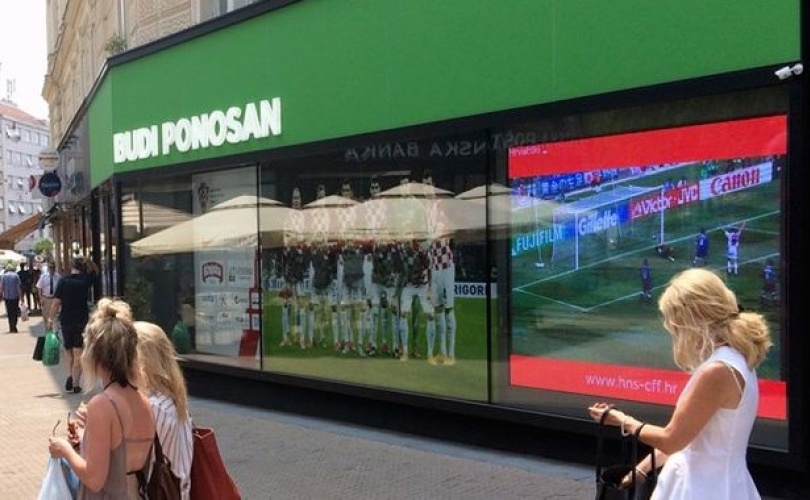
"That thing is a MUSEUM?" asked my friend incredulously. "It is literally two blocks from my house, I have walked past it every day for years and had no idea it was a museum."
And, if a local resident had no idea, so too the large number of football-loving tourists visiting the Croatian capital. It is not quite clear if the 'Budi Ponosan' (Be Proud) facility is a museum or a multi-media information centre from a search on the Internet. What is clear is that it is hardly known about at all despite being open for almost four years. Search results for 'Croatian football museum' take up less than a page on Google, a little more than the number of TripAdvisor reviews - just eight in all languages.
The little information that there is about the museum/information centre is also quite revealing about yet another missed opportunity. One of the few mentions of the museum/information centre is from the Malay Mail on the day of the World Cup Final:
On the museum's reception desk a bilingual sign in Croatian and English reads: “Dear visitors, in this Centre we DON'T SELL sporting equipment!!!”
“Hundreds of Croatians and foreign tourists come in every day now looking to buy replica jerseys,” said a museum guide, Katalin Kovak, 28.
Budi Ponosan is centrally located just off the main Ban Jelacic square - how crazy is it that people walk by thinking they are coming to a shop to buy a football shirt and do not realise they are entering a museum/information centre?
Some friends have been inside and say that, although it is tiny, the museum/information centre has some good stufff, including the first football used in Croatia and some small exhibitions on the famous 1998 and 2018 World Cup campaigns.
But surely this is a HUGE opportunity to do something magnificent, something that could attract many families and football lovers, as well as providing a really fun activity for those rainy days.
In this multi-media interactive world, just think about what such a museum could contain...
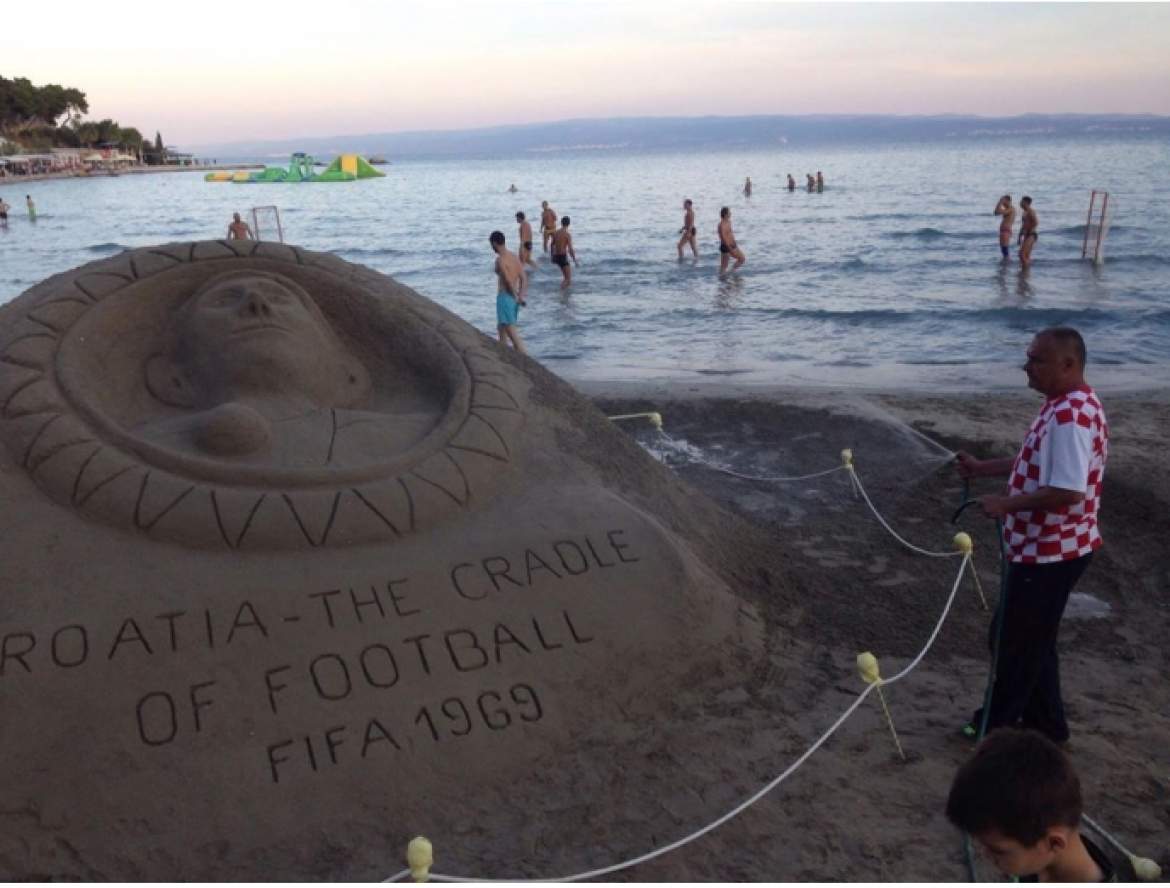
- How many people know, for example, that football actually originated in Croatia? A claim featured in the official FIFA newsletter way back in 1969!
What a great chance to highlight the oldest football match of them all and the wonderful inland Dalmatian towns of Sinj and Trilj.
- An exhibit on the incredible story of France '98 when Croatia came third in their first-ever World Cup as an independent nation.
- An exhibit on the incredible story of Russia 2018 - no more needed from me on that achievement - still so fresh in the minds of tens of millions.
- An exhibit on the destinations the 2018 heroes are from - what a great way to promote some of the lesser-known parts of Croatia. The heroes of Slavonia, Vida (Donji Miholjac) and Mandzukic (Slavonski Brod), Lovren (Karlovoc), Strinic and Rebic (Imotsi), Dalic (Varazdin), Perisic (Omis), Kalinic (Split), Kovacic (Zagreb), and the Zadar street kids of Modric, Subasic, Vrsaljko and Livakovic.
- A special exhibit on the most famous name in Croatian football - from 5-year-old goat herder to one of the most famous names on the planet.
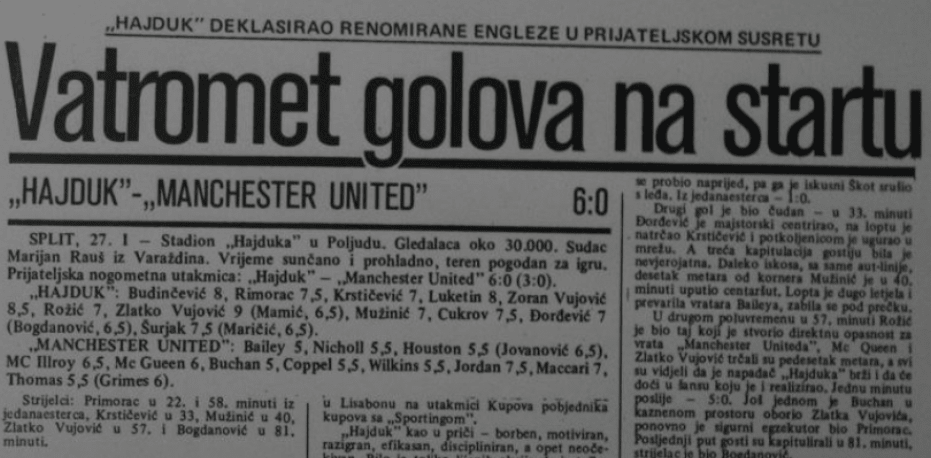
- The history of Hajduk Split, so much more than just football - the oldest club in Croatia.
- A section on Croatian footballers around the world - a truly amazing list for such a tiny country.
- The Forska Liga, the amazing league on the island of Hvar, which I think is the only fully functional island league in the world (I may need correcting on that one) - 11 teams on an island with a population of under 11,000.
- The weird and wonderful stadiums of Croatia, none more bizarre than the one at the bottom of the Blue Lake in Imotski.
- An interactive section to beat all interactive sections. Let visitors experience what it was like to be on the streets of Zagreb with 550,000 others welcoming the World Cup heroes home. Or to be at Poljud in the North Stand with Torcida. Or on the road to Moscow in 2018. So many things you can do to make Croatia really Full of Life.
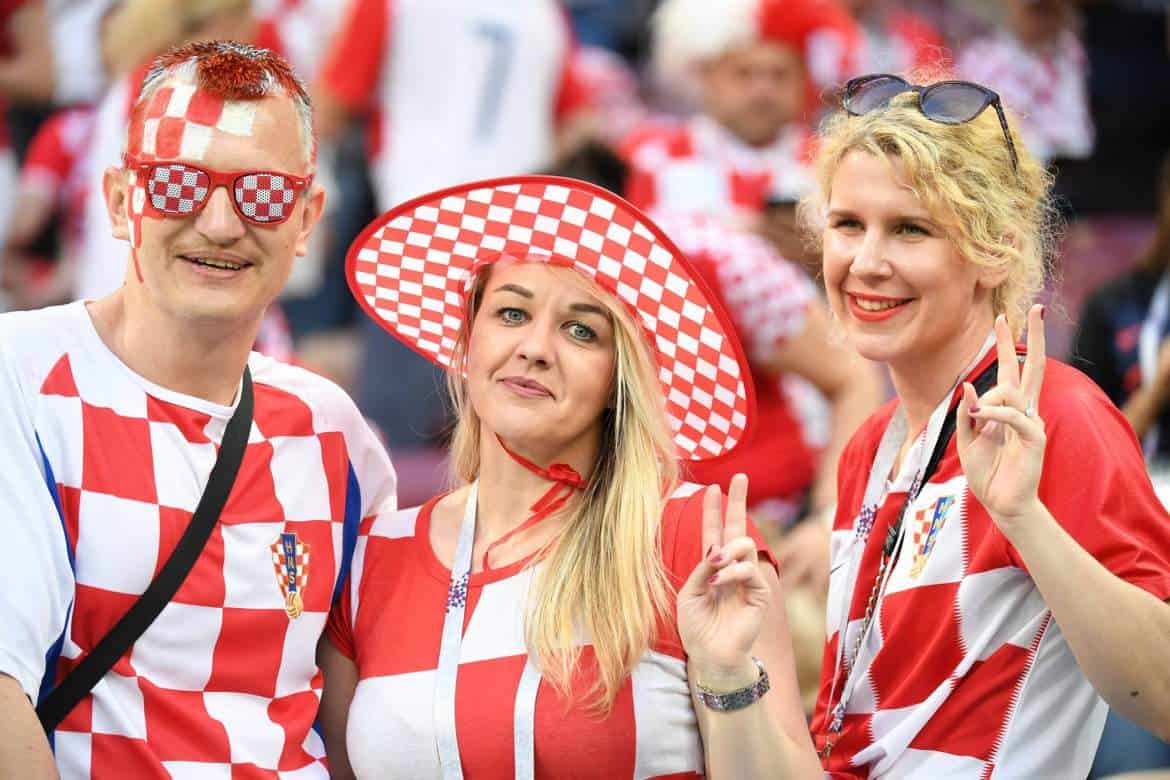
(photo credit Slobodan Kadic)
- A shop! I am stunned at how little the obvious souvenir of the Croatian shirt has been taken advantage of this summer. It is a sexy and popular souvenir, and an imaginative gift shop could almost be an exhibit of its own, as well as a good money-spinner.
Football connects tourism with tourists, and a proper Croatian football museum would not only be a big attraction, but also a fantastic opportunity to showcase many Croatian tourism destinations as well.
It really is not complicated.
Learn more about the fascinating world of Croatian sport with the Total Croatia Sports in a Page guide.
Lessons from the Private Sector: Creating Viral Croatian Tourism Campaigns
September 8, 2019 - Tourism promotion is a complex thing, but how to achieve a global viral Croatian tourism campaign without breaking the bank? Lessons from the private sector.
One of the nicest feelings as an online writer is producing an article that goes viral. It is not a common occurrence - at least certainly in my case - but when it happens, it is truly uplifting and a joy to watch unfold.
I have only written one truly viral article in the 8 years I have been spamming the Internet, and ironically it was an article which took me about 20 minutes to write. When I think of the articles I have put hours of my life into which have been largely ignored, I have to laugh. A little like winning that recent media award in Malaysia for one article, compared to the thousands I have written about Croatia.
The article in question was 25 Reasons You Should Never Visit Croatia, and it got over one million hits in the first 24 hours. After years of writing and trying to get my stuff shared, it was wonderful to sit back and watch the Internet explode, as first national and then regional portals reported on the article. The number of likes, shares and comments were unbelievable. Some called it the best promotional article about Croatia they had seen, and while I would not agree, it was certainly nice to see the very positive feedback. There were also a lot of shares and kind comments among tourist boards, although nothing from our friends from the Croatian National Tourism Board, which actually deleted the link several times as people posted it on their page to share. Apparently, they have an automatic deletion programme for any links posted, and they could not share it as it was on a commercial website. So there you go.
But while the article was a huge hit, and while it probably gave the impression of being a viral hit way beyond Croatia's regional borders, it actually did not make much of an impact internationally, as it was shared mostly in Croatian and not in English. And for a tourism promotion article to be truly effective, it has to go viral in the language that tourists can read in, most notably English. And so, while I enjoyed all the attention at the time, the main effect of the article was giving a feel-good factor to people of Croatian original. Which is also a good thing.
Viral global campaigns and articles, especially those on a budget, are quite rare to find, especially in Croatia. They are even rarer to find from official channels, and the genius for viral campaigns is most notably to be found in the private sector.
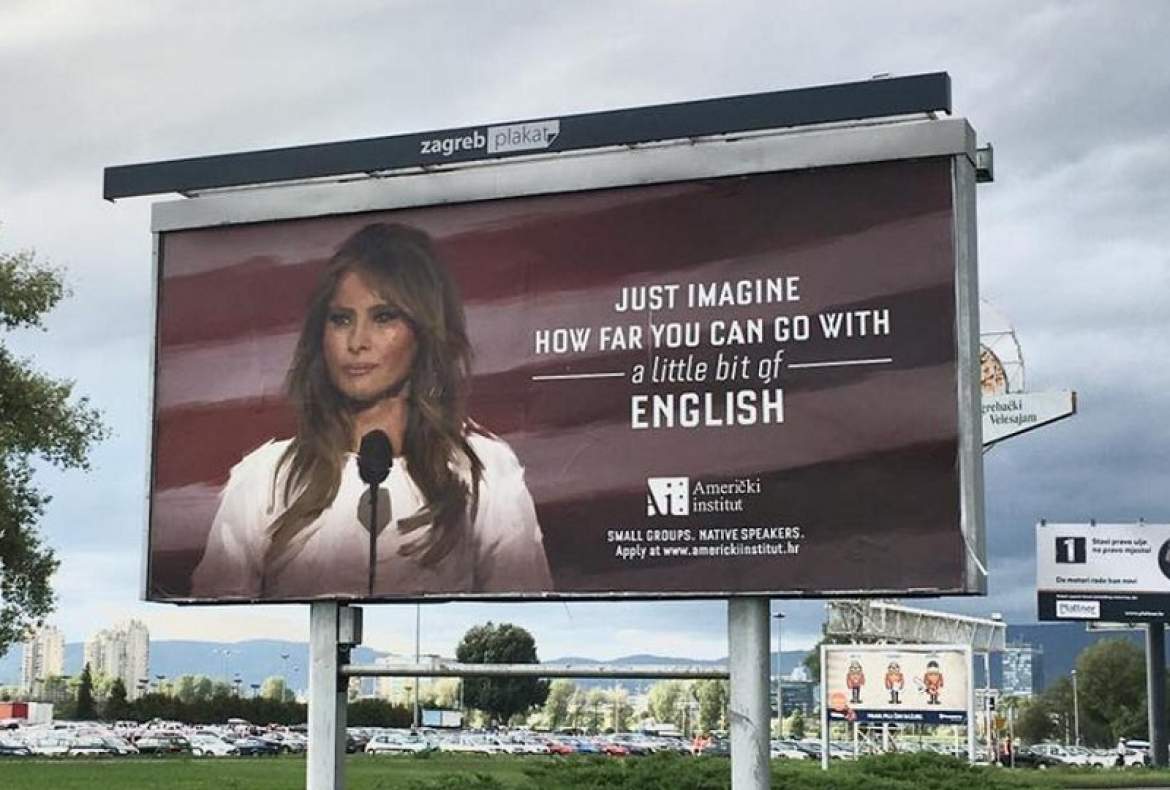
Arguably the best promotional campaign in the history of Croatia took place 2 years ago. It was not tourism-related, but the Melania Trump 'Imagine how far you can go with a little bit of English' campaign was covered by seemingly every major news publication across the globe. Budget? Very little. The secret? Take a globally known name, add something provocative or quirky, and let the Internet do the rest.
So does Croatian tourism have similar successes in its marketing - viral campaigns that have people laughing and discussing for days, while checking out the latest holiday offers in Croatia?
Well...
If we look at the official Croatian tourism promotion, the record is pretty poor, at least in my opinion. I really liked the slogan The Mediterranean as It Once Was, all those years ago - indeed it was while watching the advert on CNN in Somaliland back in 2002 that made me decide to move to Croatia - but I don't feel the same branding and appeal has been achieved with the 'Croatia, Full of Life' campaign.
Comparing the cost efficiency and viral effect of the Melania campaign above (and several private sector tourism promotions below) certainly puts things in perspective. One of the more bizarre (and expensive - £425,000 rings a bell in my head, but as most references to it have seemingly been erased from the Internet, it is hard to confirm) tourism promotion ideas to launch Croatia, Full of Life was to have a floating Croatian island floating down the River Thames in London for two days only, according to Campaign Live, one of the few websites which still remembers the event. I am sure it was a nice day out for the Chosen Few... And it probably proved to be better value for money that the 100,000 euro Zadar taxpayers bill and 60,000 euro Zadar Tourist Board contribution to the Rita Ora shambles recently.
Croatia has had two huge PR gifts in recent times, where some intelligent and innovative PR campaigns could have done wonders for its global tourism promotion. The first, of course, is the World Cup, and it has been fascinating to see different people claim credit for the unprecedented interest in Croatia in July last year. At the time, Croatian National Tourism Board Director Kristjan Stanicic was quoted in the media as saying that the CNTB website traffic had increased by 250%, as though CNTB was responsible for that increase. TCN's traffic went up 600% in the corresponding period, not because we did anything more than report on the heroics in Moscow, but more because every man and his dog was Googling 'Where is Croatia?', and our website ranks pretty well for those kind of searches.
Yes, the World Cup promotional video (somewhat ironically recorded months before the World Cup when Croatia was not expected to do anything special in Russia - you can learn about the story of how it was made here) played some part in spreading the word about Croatia, but I had to laugh at Tourism Minister Gari Cappelli's claim in the recent interview above in which he said that only 30-40% of people knew what Croatia was before the semi-final with England, and some 75% after the semi-final victory, as though that increased awareness was somehow down to him and his team, and not the team on the pitch in Moscow and the fabulous fans, who were outstanding ambassadors throughout the tournament.
Some 60 BILLION mentions of Croatia in those crazy days in July, more than the entire time of the 28 years of the modern Croatian State. The work of our official tourism experts was just beginning, surely?
Apart from a few tweaks of the video for various markets and an article on the geographic locations of the players' birthplaces, that was more of less it. I was waiting for the clever campaign to entice tourists to discover the Slavonia of Mandzukic and Vida (with all the traditional dress and pomp that would entail), a competition to come to the Luka Modric Street Soccer tournament in Zadar.
But instead, nothing. And the great World Cup dividend opportunity failed to materialise, as Google Trends shows, above. The best hope to cash in on the football dividend in the future, it seems, is to hope the boys play well, share the video again and take all the credit.
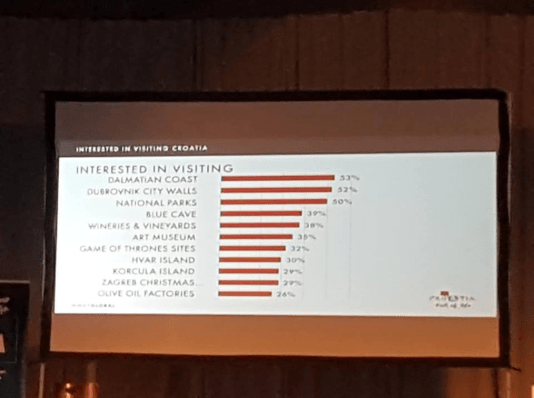
The second huge gift for Croatia was Game of Thrones. There has been filming here for 8 years, and Kings Landing, aka Dubrovnik, has become something akin to the spiritual home of the hit HBO show. Until recently, neither the CNTB or Dubrovnik had even a section on GoT (still the case) and a search for 'Game of Thrones' would bring you to a blank page in both cases. Thankfully, after a little media attention to the matter, there is at least some info there now. More on that in a later article.
But this April took missed opportunities by the Kings of Accidental Tourism to new levels. The launch of Series 8 of Game of Thrones was arguably one of the most anticipated events in television history and a gift almost up there with the World Cup. Over 100 brands partnered with HBO to promote their brand in association with hit show. Johnnie Walker came out with a special Winter is Coming White Label.
And the Croatian National Tourist Board?
Not even a post on Facebook.
But the private sector saw the opportunity and took full advantage. In one of the most innovative and cost-effective viral campaigns ever to come out of Croatia, Uk-based agency Unforgettable Croatia came up with a campaign which went all over the world. A quirky hook on a global brand, which worked like a dream. Simply guess how Game of Thrones Season 8 will end and win a luxury $5,000 trip to Croatia. And I am willing to bet that the agency did not even have to pay all that, as hotels would probably gift the room for free in exchange for the publicity.
This is how successful the campaign was, according to an email response I received from Unforgettable Croatia:
The idea for our Unforgettable Croatia ‘Guess-the-Ending’ Competition came from our fantastic marketing and creative team. The competition was open from 14 April to 5 May, just before the final episode was aired. The reason we got so much great coverage was down to the creativity of the idea, the timely advantage of the final series and that we were willing to give a fantastic prize that was worth around $5k.
The result of this campaign has meant that we've been aired throughout US television including Fox News and NBC News. We've also been incredibly fortunate to have over 300 magazines and news outlets worldwide feature the story. The most prominent ones being Cosmopolitan, Condenast, the Independent, Elle Magazine, Travel & Leisure Magazine, Yahoo, MSN and Thrillist.
During the period in which we ran the competition, we had 98,200 unique visitors to our Game of Thrones competition page and 14,487 applications which was an incredible response. It has taken us a bit of time to choose the winner due to the overwhelming response. We have chosen a winner and they have been notified, though we are just waiting for them to respond. We plan to share pictures of their trip on our social media channels once completed.
When CNTB finally got around to doing something halfway through Series 8 (perhaps in response to the criticism, or perhaps due to the paperwork with HBO Adria), it was all rather curious. A fantastic prize - to watch the final episode at a special screening in Kings Landing - was restricted to just 14 countries, mostly local and target markets of HBO Adria. The important US market, where GoT ranks as one of the biggest points of interest for Croatian tourism - see slide above - was one major market completely omitted with this latest gift.
But the private sector was not finished with Game of Thrones. No sooner was the final episode done than another private company, Cruise Croatia, launched another product which went viral - a 7-day GoT-themed cruise from Split to Dubrovnik. Thrillist, Lonely Planet, USA Today, Daily Star, Daily Mirror, CN Traveler, Forbes - just some of the international media which picked up and promoted the story. Budget? Zero.
And Unforgettable Croatia was not finished with their innovative, viral and extremely cost-effective campaigns.
They followed up with a campaign about their sustainable approach and removing plastic from their ships for 2020. They plan to also donate a percentage of our profits to the Blue World Institute in Rovinj to support their efforts in dolphin and turtle research and conservation. They aimed to be the most eco-friendly cruise company in Croatia. To celebrate this campaign, they launched a Travel Scholarship where they offered 1 lucky individual the chance to spend 2 weeks volunteering with the BWI in Rovinj and then spend 2 weeks with Unforgettable Croatia visiting Croatia and doing one of their cruises.
Low-budget campaign, big viral success. The campaign was featured in Unilad, Business Insider, Insider.com, MSN News, Yahoo News, Travel + Leisure, Metro.co.uk and The National.ae, among others.
As far as I am aware, the Kings do work with international PR agencies, but are they the right ones? With the inability to take advantage of such gifts as the World Cup and Game of Thrones while the private sector is wiping the floor with great ideas delivered virally, is it time for a rethink? The Zadar taxpayer, for one, might have some thoughts on this after the recent Rita Ora fiasco.
Gari Cappelli Appoints Former Tourism Minister as Special Advisor
As Marija Crnjak/Poslovni Dnevnik writes on the 6th of September, 2019, unofficial confirmation from the Ministry of Tourism that Tourism Minister Gari Cappelli has now appointed Ivan Herak as a special advisor for the strategic tourism development plan and EU projects was recently received.
As was publised by Glas Istre, an Istrian portal on Thursday, Herak will hold office without a fee, and his appointment was preceded by the explicit consent of Prime Minister Andrej Plenković.
The engagement of Ivan Herak, who is actually the former Minister of Tourism during the mandate of the Croatian Government led by Zlatko Mateša from 1999 to 2000, is not a surprise or a shock when it comes to Gari Cappelli's team. Gari Cappelli's advisory post was initially offered to Herak way back in the spring of 2017, and only now has it apparently been properly formalised.
This marks just one of a number of Herak's engagements, the rest of which don't all have something to do with the tourism industry.
Herak appears to be a jack of all trades. He is currently a member of the board of directors of the Institute of Tourism, a professor at the Swiss School of Business in Geneva, he teaches postgraduate doctoral studies at the Faculty of Economics in Osijek and he is an advisor to the Chinese Association for SE Europe.
He has also recently been hired by the Chinese for the construction of a brand new football stadium, a camp, an academy and other business facilities that are being planned on the site adjacent to the existing Gorica Football Club stadium.
On top of all that, Herak is also the director of the Eurogate Sport Industries company which based in Zagreb. When it comes to tourism, in his public speeches, he advocated for the lowering of VAT in the tourism sector and addressing the issue of tourist land. He has also frequently warned against the extremely detrimental nature of the over-development of cruise ship tourism in Croatia.
Make sure to follow our dedicated politics and lifestyle pages for much more.
Croatian Tourism Ministry Fails in Its Key 2013-2020 Main Development Goal
September 5, 2019 - But in a sign of progress, the Croatian Tourism Ministry seems to have mastered the spelling of the word 'until' since 2013.
Accountability - or the complete lack of accountability - is something that fascinates me living here in The Beautiful Croatia. I have lived in some interesting places on the planet, but nowhere have I ever come across a country where there is less accountability than in Croatia.
When I was an aid worker in Rwanda after the genocide, I caught my warehouse manager stealing from the warehouse, and we reported the theft to the military regime which had taken over after the most murderous 100 days in human history. After a short 'trial', the warehouse manager had admitted his guilt and the Colonel presiding over proceedings looked at me with an air of impatience:
"So he is guilty. What do you want us to do with him? Shoot him?"
The power of life and death, just like that. I replied along the lines that I expected him to be punished according to the prevailing law of the land for the crime committed, and I was relieved to learn that this was not death by firing squad but a prison term from which he emerged hopefully a better person.
I have thought of that incident a lot over the years in Croatia, for here is a country where there is no accountability whatsoever if you are part of the chosen few (and not so few).
And so to one of my favourite documents in this beautiful land - the Croatian Tourism Ministry's 7-year strategic plan for developing tourism. A plan with absolutely no relevance to what has happened in the years it had been planned for, but rather than have a look at what went wrong and lessons learned, Minister Cappelli is busy talking about tenders to create a new expensive 7-year plan.
The 2019 Travel & Tourism Competitiveness Report has just been released, and it shows that the Croatian Tourism Ministry has failed in its main goal of development in the last six years, which - as you can see above - was to become ranked among the top 20 countries in the world by 2020. The report, which comes out once every two years, has Croatia languishing in 27th place, immediately behind Ireland, Greece, Belgium and Luxembourg, quite some distance from the entry level to its stated goal. You can read the entire report here.
The 2020 vision, as envisaged back in 2013. We still have a year to go to realise it...
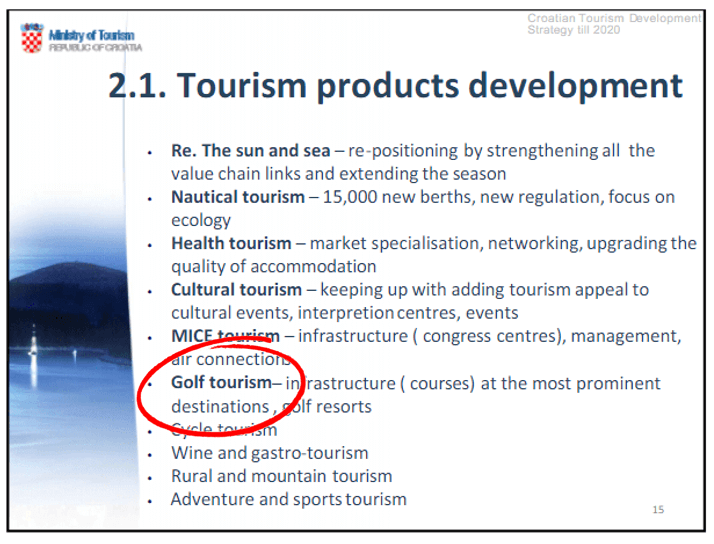
Over the coming weeks, TCN will be taking a closer look at the success of the various target sectors outlined in the 2013 strategy, which are summarised above. We will be looking for feedback from the ministry, as well as tourism experts in the various fields of niche tourism identified for Croatia's development all those years ago.
One of the sectors which we will not be covering in this is golf, as we have already written extensively about it. Golf does set the tone of the effectiveness of the implementation of the strategy, however. The 7-year plan envisaged no less than 30 golf courses to be built by 2020. With three months to go until (note the spelling - not 'untill'), not only has no planning been approved or work started on any course, but the Croatian State is facing a US$500 million lawsuit from an Israeli golf investor in Dubrovnik. The fact that nothing is being built does not deter the Kings of Accidental Tourism - there will be no less than THREE golf tourism conferences in Croatia in 2019 alone. Quite what they talk about is beyond me.
But while one might argue that the lack of progress from 2013 is not the fault of the document strategists, one might argue that their plan was a little ambitious, given the fact that only one golf course has been built this century, and even the King of Golf himself, Jack Nicklaus, had to give up on his 200 million euro golf resort dream, despite the public endorsement of the then Prime Minister.
Despite the lack of progress, the golf dream is not dead, at least not in the eyes of the Croatian Tourism Ministry, where a senior official confirmed to me that golf would be very much part of the next strategic plan. Presumably with lots of golf tourism conferences thrown in to make things look busy.
The first two niches we will be looking at are medical tourism and MICE. If you work in these sectors and have something to contribute, please contact us on This email address is being protected from spambots. You need JavaScript enabled to view it. We will also be contacting the ministry for their input.
And here is hoping that the 2021 Strategic Plan can spell basic words like 'until'. That would be real progress.
Bloggers, Journalists and YouTubers Promote ''Croatia, Full of Islands''
As Morski writes on the 4th of September, 2019, for the third year in a row, the Croatian National Tourist Board (HTZ) has been implementing the project "Croatia, Full of Islands to Discover", which aims to promote nautical tourism as a tourist product, ie, to position Croatia as an attractive and quality nautical destination.
As part of the project, twelve well-known bloggers, YouTubers and journalists from across Europe and from outside of it, (United Kingdom, Germany, France, Sweden, Norway, Hungary, Switzerland and Japan) will discover the gorgeous islands of the Šibenik archipelago from September the 7th to September the 11th.
''This is a successful project that has had great promotional effects in its previous issues. For this reason, we've continued its implementation, and this time the localities of the Šibenik archipelago are the focus. Nautical tourism is one of the main Croatian image products that emphasises the most beautiful thing that Croatia has, as well as what was confirmed by the results achieved this year in the nautical charter segment, where we recorded almost three million overnight stays, which marks growth of three percent compared to the same period last year,'' stated the director of the Croatian National Tourist Board, Kristjan Staniči, adding that the promotion of nautical tourism is also carried out through Croatia's appearances at specialised fairs and through marketing and PR campaigns.
The tour program includes a tour of the national parks of Krk and Kornati, the islands of Murter, the City of Šibenik and Prvić Luka, and as part of the tour of some of the locations, attractive localities, customs and the wide gastronomic offer of this part of Croatia will be presented. The promotion is focused on news reports in newspapers and magazines and posts on blogs and social networks like Facebook, Instagram, Twitter and YouTube, where participants of this unique experience will share their impressions with their numerous readers and followers.
This year's program includes, among others, journalist Eleanor Rudd, a contributor to the UK-based Metro.co.uk, with more than 54 million readers monthly. Croatia's glorious coast will also be sailed along by French journalist and photographer Gregory Gerault, who will describe his experiences in a report in the daily Le Télégramme and Le Monde du Camping-Car. Among the attendees is the American YouTuber with a British address, Evan Edinger, watched by almost 700,000 followers on his YouTube channels dedicated to general topics and travel, as well as Hungarian YouTuber Fruzsina Viszkok, who is active on the social networks Facebook, Instagram and Twitter, where she's followed by around 480,000 fans .
The project "Croatia, Full of Islands to Discover" is a continuation of the promotional activities carried out by HTZ this year with the aim of further promoting Croatia's nautical tourism product, and the desire for an even stronger market positioning of Croatia as an ideal nautical destination.
Make sure to follow our dedicated travel page for much more.
Losinj Achieves 2 Million Overnights for 11th Consecutive Year
September 3, 2019 - For eleven consecutive years, the town of Mali Losinj has reached 2 million overnight stays.
This year, by September 1, Mali Losinj achieved 2,013,495 overnights, making it one of the top ten Croatian destinations with the most, reports Novi List.
Thanks to the promotion of key attributes of the image of Losinj island, as well as the efforts and activities invested in organizing events and enriching the year-round offer, from January to August 2019, there were 262,898 arrivals and 1,998,235 overnights.
Guests from Croatia recorded a 4% increase in overnight stays, while foreign guests recorded a 2% decrease in overnight stays, with an average tourist stay of 7.6 days. When looking at the age structure, leading guests are over 35.
The share of total overnights spent by Croats is 14.5%, while foreigners occupy 85.5%. Almost 67.4% of foreign guests came from already four traditionally important broadcast markets; Slovenia, Germany, Italy and Austria. It is led by guests from Slovenia (26.5%), Germany (19.3%), Italy (12.2%), Austria (9.4%), Czech Republic (2.8%), the Netherlands and Poland (1.7%), France (1.5%) and other countries (10.4%).
Looking at the results by accommodation, the most visited were camps (35.3%), followed by households (18.7%), hotels (18.3%) and other types of accommodation (27.7%). Also, the most overnight stays were in Mali Losinj (51.1%), followed by Nerezine (17.8%), Veli Losinj (11.9%), Punta Kriza (6.7%), Osor (4.6%) and other places (7.9%).
In August alone, 762,351 overnights were recorded, which is an increase of 1% compared to the previous year. The arrivals in August totaled 85,382, which is an increase of 5%. The highest percentage of overnight stays in August 2019 was realized in camps (285,454 nights - 37.4%), followed by visits to domestic and private accommodation (152,320 nights - 20%), by hotels (104,408 nights - 13.7%), other hospitality accommodation (82.738 nights - 10.8%) and non-commercial accommodation (137.431 nights - 18.1%).
Many options and events are available for guests who choose to spend their holidays on the ‘island of vitality’. Namely, from September 7 to September 21, 2019, the festival “Losinj sails around the world” will introduce visitors to the golden age of Losinj seafaring through various sport, gastronomic, cultural, entertaining and educational events. The 9th Losinj Half Marathon is also held in September, followed by the 37th Arbunada and the Cres-Losinj Triathlon in October, the 21st Lošinj Cup - Optimist Regatta, and in November, the Cres-Losinj Trail weekend.
To read more about travel in Croatia, follow TCN’s dedicated page.
Croatian Tourist Season Worse Than Turkey, Better Than Greece
In August 2019, there were 4.7 percent more arrivals and 2.6 percent more overnight stays in Croatia, despite the mixed bag of news about the state of Croatian tourism - which desperately still requires a major shake-up.
As Marija Crnjak/Poslovni Dnevnik writes on the 1st of September, 2019, as we're now at the end of the height of the Croatian tourist season, the country managed to come out of a very challenging tourist season still with a plus, in spite of an abnormally rainy May and a far weaker July.
According to eVisitor's data obtained by Poslovni Dnevnik from the Croatian National Tourist Board (HTZ), 16.2 million arrivals and 88.5 million overnight stays have been recorded so far, which represents a 4.1 percent increase in arrivals and 1.6 percent overnight stays compared to the same period last year.
In August alone, there were about 4.7 million arrivals and 31.5 million overnight stays realised, marking a welcome plus of 4.7 percent in arrivals and another plus of 2.6 percent in overnight stays when compared to the same period last year.
The official results of 2019's Croatian tourist season will be presented over the coming days by Croatian Tourism Minister Gary Cappelli and Kristjan Staničić, the director of the Croatian National Tourist Board. The minister already announced last week that this year would end in a plus, thanks to good forecasts for the post-season, which continues to be counted in Croatia as of September.
Croatian campsites, however, have experienced a minus.
Croatian campsites are the only segment of accommodation that has remained with a minus of 1.3 nights in overnight stays even at the end of August, which is still slightly better than at the end of July.
The best performers were Croatian hotels with almost six percent more arrivals and 1.8 percent more overnight stays, while private accommodation had 5 percent more arrivals than last year, as well as 2.5 percent more overnight stays. After a minus in July, apartments progressed in August, which is still low considering that another 33,000 new beds have been opened in that segment this year.
Judging by the first results coming from other Mediterranean countries, Croatia is expected to perform much lower this year than Turkey do, but still better than Greece, which is recording minuses.
Turkey hosted 24.69 million foreign tourists in the first seven months of 2019, up 14 percent from last year, with Istanbul in first place in terms of tourist arrivals. Antalya attracted a record number of 10 million foreign tourists by August the 22nd, up 17.6 percent from 2018, while a year earlier, Antalya, had 6.7 million tourist arrivals.
An analysis of STR also showed that this summer in Turkey, with the occupancy of hotels, the average room rate also increased.
The average price for a room at a five-star hotel in July thus rose by 14 percent, reaching 100 euros, and 103 euros in Istanbul. Antalya had the largest increase in the average room rate of 22 percent, to an average of 172 euros per room in a five star hotel.
However, after two years of very good results, Greece has seen a drop in hotel turnover this summer. The Hotel Association of Greece found that hotels in Greece experienced a minus of 15 percent in mainland destinations, and 10 percent on the islands, forcing them to slash their prices.
For Greek hoteliers in 2020, the main challenge will be how to bring back guests from Western Europe who travel by road.
Make sure to follow our dedicated travel and lifestyle pages for much more on Croatian tourism and destinations.
Czech Tourists More Important for Tourism in Croatia than Croatians Think
September 1, 2019 - Czech tourists are often referred to as the ‘pašteta tourists’ of Croatia, or tourists who would rather travel cheap and eat pate on vacation than spend their money in restaurants or bars. But is this really the truth?
After the Croatian media reported about the shameful act of a Czech traveler who dumped feces from his yacht into the sea near Komiža, many comments followed stereotyping Czech tourists in the Adriatic. The news even spread to the Czech Republic, and the portal Blesk claims that Croats unjustifiably launched a discriminatory campaign against their tourists, reports Splitski Dnevnik.
"It is very unfair to give us the stamp of ‘pašteta tourists’. Czech guests are absolutely crucial for Croats. Nearly one million people come to the Adriatic every year,” said Jan Papež, spokesman for the Czech Association of Travel Agents in Blesk.
Moreover, according to Papež, they do not only spend their summers staying in the cheapest accommodation.
"Many go to four-star and higher-category hotels," he added. He also emphasized that after the war in the early 1990s, when the world was not interested in Croatia, the Czechs came first.
"And now we are not losing interest, even though prices are increasing by five to ten percent every year," Papež said.
Last year, 32,763 Czech boaters visited Croatia (and realized 218,404 overnights). And it probably doesn’t need to be stressed that they didn't eat pate, the author wrote. Most Czech tourists also rent boats on-site, which cost between 800 to 50,000 euros per week.
But how much they spend doesn’t end here. Anchoring and mooring boats must also be taken into account. For example, in Split, anchoring a yacht from 10 to 20 meters will cost around 700 to 1600 kuna per night.
Parking a car in the marina sets you back around 40 to 60 euros a week, which is supplemented by fresh water, fuel or electricity, or wifi for an overnight stay in the marina. The total cost of the week is about 600 euros per person, without traveling around Croatia, food, and drink, the Czech journalist calculated.
"According to a rough estimate, Czech boaters spend around 180 million kuna in the country that calls us 'pašteta tourists'," Blesk added.
According to a survey by the University of Rijeka last year, Czechs spend an average of 390 kuna a day in Croatia, which isn't much compared to the British who spend an average of 915 kuna.
“But the Croats themselves spend even less. They are the second-largest group of tourists in the country, spending 368 kuna a day,” the portal said.
If the statistics do not lie and we multiply 5,489,607 Czech overnights in Croatia by average spending, Czech tourists brought about 2.2 billion kuna to Croatia last season alone,” Blesk concluded.
To read more about travel in Croatia, follow TCN’s dedicated page.

